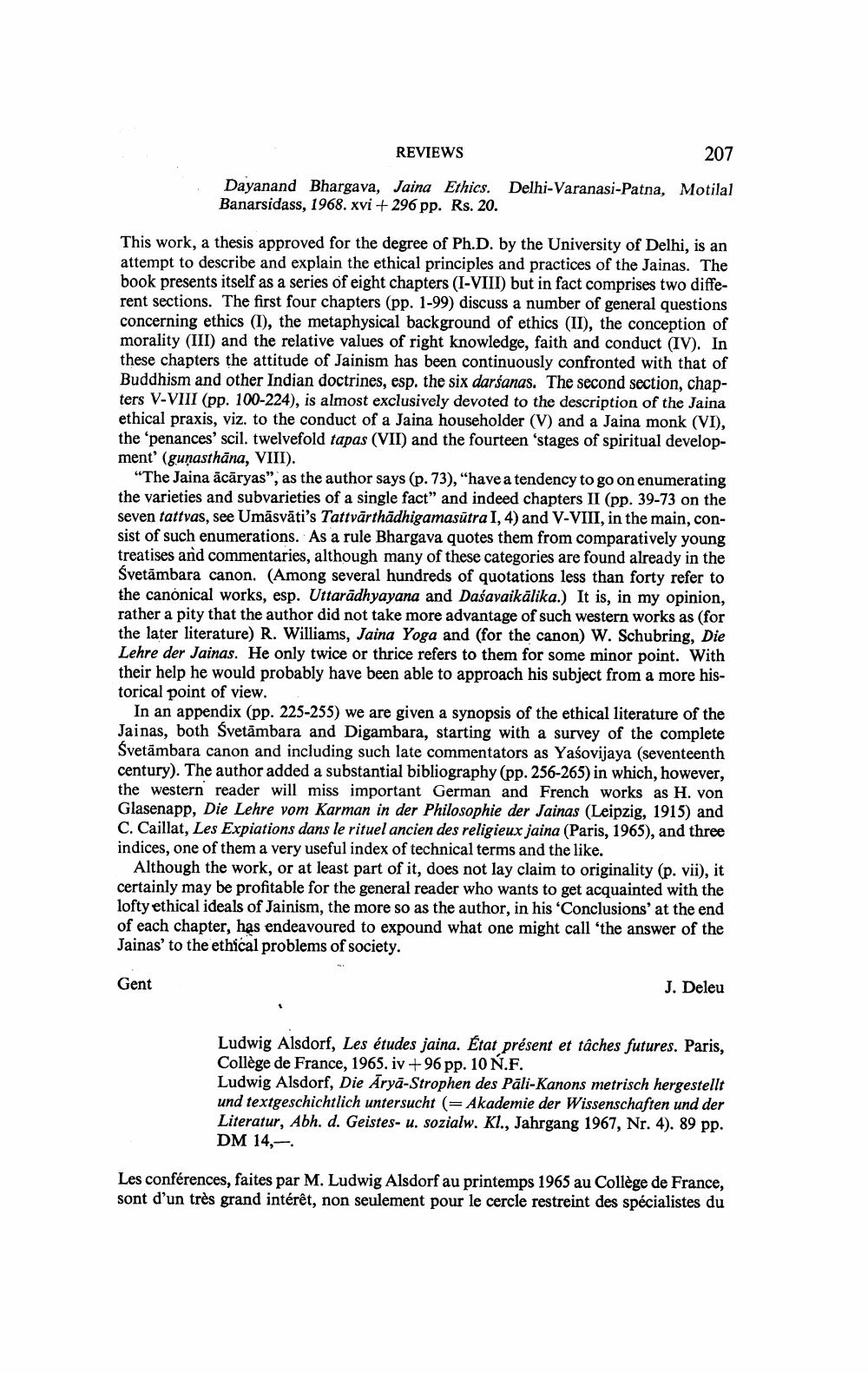________________ REVIEWS 207 Dayanand Bhargava, Jaina Ethics. Delhi-Varanasi-Patna, Motilal Banarsidass, 1968. xvi + 296 pp. Rs. 20. This work, a thesis approved for the degree of Ph.D. by the University of Delhi, is an attempt to describe and explain the ethical principles and practices of the Jainas. The book presents itself as a series of eight chapters (I-VIII) but in fact comprises two different sections. The first four chapters (pp. 1-99) discuss a number of general questions concerning ethics (I), the metaphysical background of ethics (II), the conception of morality (III) and the relative values of right knowledge, faith and conduct (IV). In these chapters the attitude of Jainism has been continuously confronted with that of Buddhism and other Indian doctrines, esp. the six darsanas. The second section, chapters V-VIII (pp. 100-224), is almost exclusively devoted to the description of the Jaina ethical praxis, viz. to the conduct of a Jaina householder (V) and a Jaina monk (VI), the 'penances' scil. twelvefold tapas (VII) and the fourteen 'stages of spiritual development' (gunasthana, VIII). "The Jaina acaryas", as the author says (p. 73), "have a tendency to go on enumerating the varieties and subvarieties of a single fact" and indeed chapters II (pp. 39-73 on the seven tattvas, see Umasvati's Tattvarthadhigamasutra 1, 4) and V-VIII, in the main, consist of such enumerations. As a rule Bhargava quotes them from comparatively young treatises and commentaries, although many of these categories are found already in the Svetambara canon. (Among several hundreds of quotations less than forty refer to the canonical works, esp. Uttaradhyayana and Dasavaikalika.) It is, in my opinion, rather a pity that the author did not take more advantage of such western works as (for the later literature) R. Williams, Jaina Yoga and (for the canon) W. Schubring, Die Lehre der Jainas. He only twice or thrice refers to them for some minor point. With their help he would probably have been able to approach his subject from a more historical point of view. In an appendix (pp. 225-255) we are given a synopsis of the ethical literature of the Jainas, both Svetambara and Digambara, starting with a survey of the complete Svetambara canon and including such late commentators as Yasovijaya (seventeenth century). The author added a substantial bibliography (pp. 256-265) in which, however, the western reader will miss important German and French works as H. von Glasenapp, Die Lehre vom Karman in der Philosophie der Jainas (Leipzig, 1915) and C. Caillat, Les Expiations dans le rituel ancien des religieux jaina (Paris, 1965), and three indices, one of them a very useful index of technical terms and the like. Although the work, or at least part of it, does not lay claim to originality (p. vii), it certainly may be profitable for the general reader who wants to get acquainted with the lofty ethical ideals of Jainism, the more so as the author, in his 'Conclusions' at the end of each chapter, has endeavoured to expound what one might call 'the answer of the Jainas' to the ethical problems of society. Gent J. Deleu Ludwig Alsdorf, Les etudes jaina. Etat present et taches futures. Paris, College de France, 1965. iv +96 pp. 10 N.F. Ludwig Alsdorf, Die Arya-Strophen des Pali-Kanons metrisch hergestellt und textgeschichtlich untersucht (= Akademie der Wissenschaften und der Literatur, Abh. d. Geistes- u. sozialw. Kl., Jahrgang 1967, Nr. 4). 89 pp. DM 14, Les conferences, faites par M. Ludwig Alsdorf au printemps 1965 au College de France, sont d'un tres grand interet, non seulement pour le cercle restreint des specialistes du




